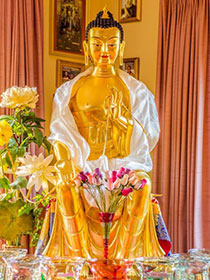- Home
- FPMT Homepage
Foundation for the Preservation of the Mahayana Tradition
The FPMT is an organization devoted to preserving and spreading Mahayana Buddhism worldwide by creating opportunities to listen, reflect, meditate, practice and actualize the unmistaken teachings of the Buddha and based on that experience spreading the Dharma to sentient beings. We provide integrated education through which people’s minds and hearts can be transformed into their highest potential for the benefit of others, inspired by an attitude of universal responsibility and service. We are committed to creating harmonious environments and helping all beings develop their full potential of infinite wisdom and compassion. Our organization is based on the Buddhist tradition of Lama Tsongkhapa of Tibet as taught to us by our founders Lama Thubten Yeshe and Lama Thubten Zopa Rinpoche.
- Willkommen
Die Stiftung zur Erhaltung der Mahayana Tradition (FPMT) ist eine Organisation, die sich weltweit für die Erhaltung und Verbreitung des Mahayana-Buddhismus einsetzt, indem sie Möglichkeiten schafft, den makellosen Lehren des Buddha zuzuhören, über sie zur reflektieren und zu meditieren und auf der Grundlage dieser Erfahrung das Dharma unter den Lebewesen zu verbreiten.
Wir bieten integrierte Schulungswege an, durch denen der Geist und das Herz der Menschen in ihr höchstes Potential verwandelt werden zum Wohl der anderen – inspiriert durch eine Haltung der universellen Verantwortung und dem Wunsch zu dienen. Wir haben uns verpflichtet, harmonische Umgebungen zu schaffen und allen Wesen zu helfen, ihr volles Potenzial unendlicher Weisheit und grenzenlosen Mitgefühls zu verwirklichen.
Unsere Organisation basiert auf der buddhistischen Tradition von Lama Tsongkhapa von Tibet, so wie sie uns von unseren Gründern Lama Thubten Yeshe und Lama Thubten Zopa Rinpoche gelehrt wird.
- Bienvenidos
La Fundación para la preservación de la tradición Mahayana (FPMT) es una organización que se dedica a preservar y difundir el budismo Mahayana en todo el mundo, creando oportunidades para escuchar, reflexionar, meditar, practicar y actualizar las enseñanzas inconfundibles de Buda y en base a esa experiencia difundir el Dharma a los seres.
Proporcionamos una educación integrada a través de la cual las mentes y los corazones de las personas se pueden transformar en su mayor potencial para el beneficio de los demás, inspirados por una actitud de responsabilidad y servicio universales. Estamos comprometidos a crear ambientes armoniosos y ayudar a todos los seres a desarrollar todo su potencial de infinita sabiduría y compasión.
Nuestra organización se basa en la tradición budista de Lama Tsongkhapa del Tíbet como nos lo enseñaron nuestros fundadores Lama Thubten Yeshe y Lama Zopa Rinpoche.
A continuación puede ver una lista de los centros y sus páginas web en su lengua preferida.
- Bienvenue
L’organisation de la FPMT a pour vocation la préservation et la diffusion du bouddhisme du mahayana dans le monde entier. Elle offre l’opportunité d’écouter, de réfléchir, de méditer, de pratiquer et de réaliser les enseignements excellents du Bouddha, pour ensuite transmettre le Dharma à tous les êtres. Nous proposons une formation intégrée grâce à laquelle le cœur et l’esprit de chacun peuvent accomplir leur potentiel le plus élevé pour le bien d’autrui, inspirés par le sens du service et une responsabilité universelle. Nous nous engageons à créer un environnement harmonieux et à aider tous les êtres à épanouir leur potentiel illimité de compassion et de sagesse. Notre organisation s’appuie sur la tradition guéloukpa de Lama Tsongkhapa du Tibet, telle qu’elle a été enseignée par nos fondateurs Lama Thoubtèn Yéshé et Lama Zopa Rinpoché.
Visitez le site de notre Editions Mahayana pour les traductions, conseils et nouvelles du Bureau international en français.
Voici une liste de centres et de leurs sites dans votre langue préférée
- Benvenuto
L’FPMT è un organizzazione il cui scopo è preservare e diffondere il Buddhismo Mahayana nel mondo, creando occasioni di ascolto, riflessione, meditazione e pratica dei perfetti insegnamenti del Buddha, al fine di attualizzare e diffondere il Dharma fra tutti gli esseri senzienti.
Offriamo un’educazione integrata, che può trasformare la mente e i cuori delle persone nel loro massimo potenziale, per il beneficio di tutti gli esseri, ispirati da un’attitudine di responsabilità universale e di servizio.
Il nostro obiettivo è quello di creare contesti armoniosi e aiutare tutti gli esseri a sviluppare in modo completo le proprie potenzialità di infinita saggezza e compassione.
La nostra organizzazione si basa sulla tradizione buddhista di Lama Tsongkhapa del Tibet, così come ci è stata insegnata dai nostri fondatori Lama Thubten Yeshe e Lama Zopa Rinpoche.
Di seguito potete trovare un elenco dei centri e dei loro siti nella lingua da voi prescelta.
- 欢迎 / 歡迎
简体中文
“护持大乘法脉基金会”( 英文简称:FPMT。全名:Foundation for the Preservation of the Mahayana Tradition) 是一个致力于护持和弘扬大乘佛法的国际佛教组织。我们提供听闻,思维,禅修,修行和实证佛陀无误教法的机会,以便让一切众生都能够享受佛法的指引和滋润。
我们全力创造和谐融洽的环境, 为人们提供解行并重的完整佛法教育,以便启发内在的环宇悲心及责任心,并开发内心所蕴藏的巨大潜能 — 无限的智慧与悲心 — 以便利益和服务一切有情。
FPMT的创办人是图腾耶喜喇嘛和喇嘛梭巴仁波切。我们所修习的是由两位上师所教导的,西藏喀巴大师的佛法传承。
繁體中文
護持大乘法脈基金會”( 英文簡稱:FPMT。全名:Found
ation for the Preservation of the Mahayana Tradition ) 是一個致力於護持和弘揚大乘佛法的國際佛教組織。我們提供聽聞, 思維,禪修,修行和實證佛陀無誤教法的機會,以便讓一切眾生都能 夠享受佛法的指引和滋潤。 我們全力創造和諧融洽的環境,
為人們提供解行並重的完整佛法教育,以便啟發內在的環宇悲心及責 任心,並開發內心所蘊藏的巨大潛能 — 無限的智慧與悲心 – – 以便利益和服務一切有情。 FPMT的創辦人是圖騰耶喜喇嘛和喇嘛梭巴仁波切。
我們所修習的是由兩位上師所教導的,西藏喀巴大師的佛法傳承。 察看道场信息:
- FPMT Homepage
- News/Media
-
- Study & Practice
-
-
- About FPMT Education Services
- Latest News
- Programs
- New to Buddhism?
- Buddhist Mind Science: Activating Your Potential
- Heart Advice for Death and Dying
- Discovering Buddhism
- Living in the Path
- Exploring Buddhism
- FPMT Basic Program
- FPMT Masters Program
- FPMT In-Depth Meditation Training
- Maitripa College
- Lotsawa Rinchen Zangpo Translator Program
- Universal Education for Compassion & Wisdom
- Online Learning Center
-
- Prayers & Practice Materials
- Overview of Prayers & Practices
- Full Catalogue of Prayers & Practice Materials
- Explore Popular Topics
- Benefiting Animals
- Chenrezig Resources
- Death & Dying Resources
- Lama Chopa (Guru Puja)
- Lama Zopa Rinpoche: Compendium of Precious Instructions
- Lama Zopa Rinpoche: Life Practice Advice
- Lama Zopa Rinpoche Practice Series
- Lamrim Resources
- Mantras
- Prayer Book Updates
- Purification Practices
- Sutras
- Thought Transformation (Lojong)
- Audio Materials
- Dharma Dates - Tibetan Calendar
- Translation Services
- Publishing Services
- Ways to Offer Support
- Prayers & Practice Materials
-
- Teachings and Advice
- Find Teachings and Advice
- Lama Zopa Rinpoche Advice Page
- Lama Zopa Rinpoche: Compendium of Precious Instructions
- Lama Zopa Rinpoche Video Teachings
- ༧སྐྱབས་རྗེ་བཟོད་པ་རིན་པོ་ཆེ་མཆོག་ནས་སྩལ་བའི་བཀའ་སློབ་བརྙན་འཕྲིན།
- Podcasts
- Lama Yeshe Wisdom Archive
- Buddhism FAQ
- Dharma for Young People
- Resources on Holy Objects
- Teachings and Advice
-
-
*If a menu item has a submenu clicking once will expand the menu clicking twice will open the page.
-
-
- Centers
-
- Teachers
-
- Projects
-
-
-
-
*If a menu item has a submenu clicking once will expand the menu clicking twice will open the page.
-
-
- FPMT
-
- Shop
-
-
-
The Foundation Store is FPMT’s online shop and features a vast selection of Buddhist study and practice materials written or recommended by our lineage gurus. These items include homestudy programs, prayers and practices in PDF or eBook format, materials for children, and other resources to support practitioners.
Items displayed in the shop are made available for Dharma practice and educational purposes, and never for the purpose of profiting from their sale. Please read FPMT Foundation Store Policy Regarding Dharma Items for more information.
-
-
27
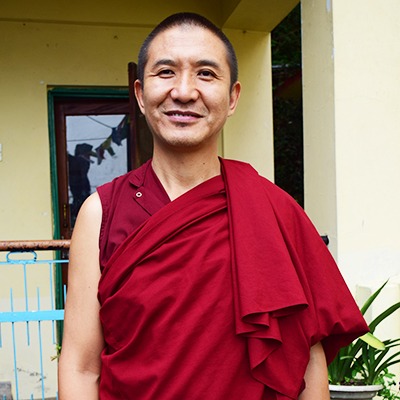
Geshe Tenzin Wangdak at LRZTP, 2015.
Geshe Tenzin Wangdak passed away from cancer on September 8, 2025 in Dharamshala, India.
Lotsawa Rinchen Zangpo Translator Program (LRZTP)’s dear teacher, Geshe Tenzin Wangdak touched the hearts of so many students and all who knew him. Dr. Filip Majkowski, Heidi Minx, and Julia Wilson shared a moving obituary and testament to Geshe-la’s many wonderful qualities:
It is with deep sadness that we share news of the passing of LRZTP’s beloved teacher Geshe Tenzin Wangdak (1972-2025) after a long and courageous battle with cancer. Geshe-la left this life on September 8, 2025 surrounded by friends and students while being cared for in Delek Hospital Dharamshala. His friendly guidance will be sorely missed by all of us at LRZTP and all others who were close to him.
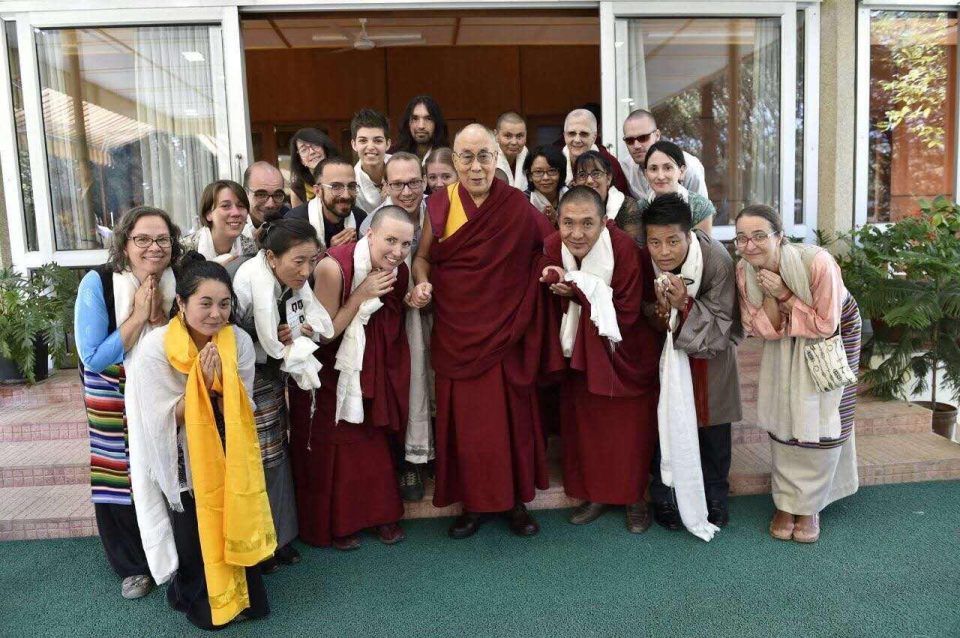
LRZTP 7 cohort audience with His Holiness the Dalai Lama, 2017 (Geshe Tenzin Wangdak is just right of HHDL).
Geshe Wangdak joined LRZTP in 2013 and eventually became one of the main Tibetan language and dharma teachers at LRZTP. Over the years he tirelessly worked creating new materials and updating the content and structure of the LRZTP two-year program of studies. His main concern was creating a friendly and learning-conducive environment for non-Tibetans to quickly learn colloquial Tibetan language and essential Dharma terminology, and in this he made himself ever available to eager students – even his lunch breaks would somehow morph into an impromptu Tibetan language lesson.
In more recent years he was heavily involved with refurbishing the school after the Covid pandemic and managing the two-year intensive program. During the last year and even up to the final month of his life he still remained involved with school through offering regular guidance to the program coordinator and helping appoint other geshe teachers to fill his positions.
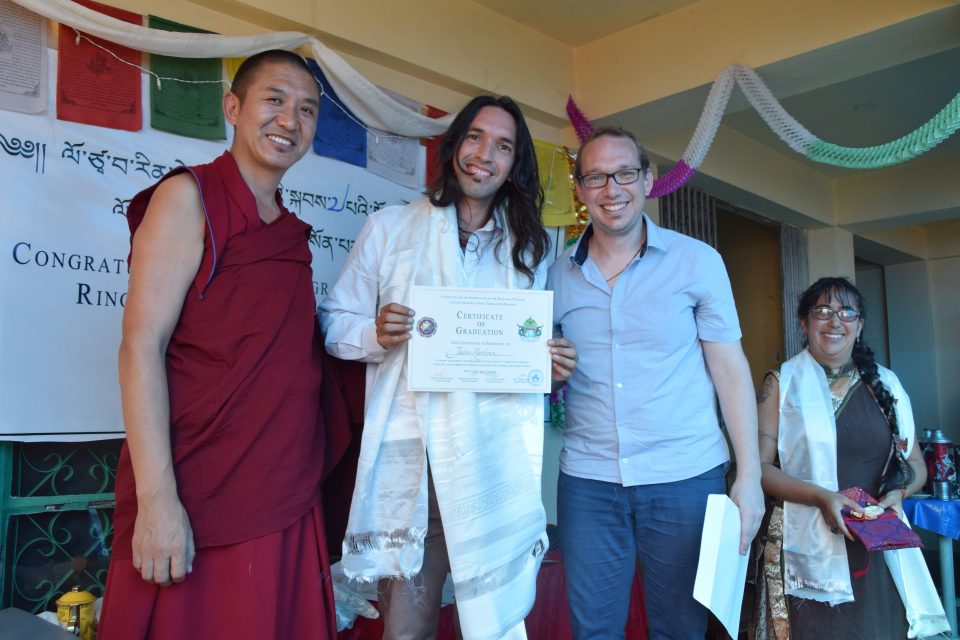
Geshe Wangdak in 2017 with Jairo, Yaron, and Martha during the LRZTP 7 graduation ceremony.
We would also like to share a couple memories of Geshe-la from Dr Filip Majkowski (a colleague from LRZTP) and from Heidi Minx (one of Geshe Wangdak’s early English language teachers and longtime friend).
Memories of Geshe Wangdak from Dr Filip Majkowski
I have known Geshe Tenzin Wangdak since 2017, when I first started working at LRZTP. From day one Geshe-la was very helpful and open minded about everything. He was always ready to reach out and help, he always had ideas and was a problems solver. He did everything with compassion and humor. By then he had already devoted so much of his time to LRZTP and the students. He had passion for his work and a big heart to all students. Much later, during the pandemic, he put the same heart and passion into teaching Tibetan online. He taught until his declining health allowed him to continue. In that he was a true inspiration to teachers and students alike.
The period of his sickness was a very sad time for LRZTP and everyone who knew him. After several months of fighting the disease in 2022 he was healthy again and it seemed he was winning. Then, in early 2024 suddenly things got worse. It was really sad to watch him lose energy and not be able to do what he loved. He could not teach, nor was he able to do house repairs, which was also his passion – in LRZTP he always had his kit with drills, hammers, screwdrivers etc. He loved that. But he still loved meeting people and give advice as much as possible.
I saw him last at the end of June, before I left for Europe. When he passed, I was back in Dharamsala, quite nearby, but unfortunately not able to see him. I regret that. I feel blessed I had this wonderful opportunity to meet Geshe-la in my life. I know we will meet again in some other life. Until then, may the blessings of all Buddhas and Bodhisattvas be with you, Geshe-la. We miss you.
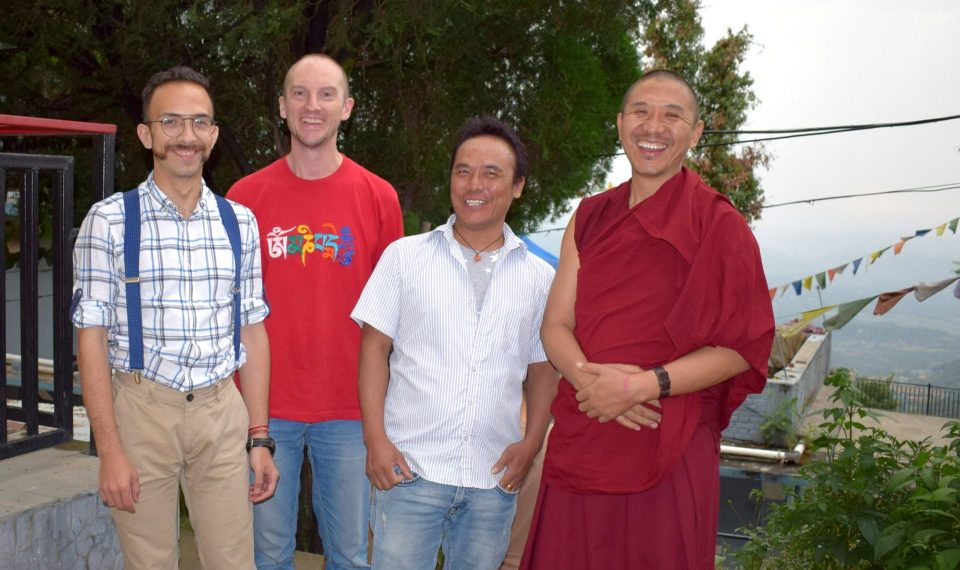
Geshe Wangdak (far right) in 2018 with (from left) Alex, Filip and Thupten of LRZTP.
Memories of Geshe Wangdak from Heidi Minx
In 2009, a program was started by the Dalai Lama Trust for a select group of geshes – a foreign language program so that when His Holiness’s office received requests for Dharma teachers, students from this group could teach in either English or Chinese. Geshe Wangdak was one of two students in the advanced English class. Geshe-la understood the nuances of learning – that it wasn’t just a written exercise based on books, but also discovering and experiencing cultural nuances. The abundance, or lack of direct translations of many words would lead us to interesting debates. The Tibetan word for weasel, neuli, led us to the western scientific naming system for rodents, and then into evolution, back to dinosaurs. Gently debating became a regular theme – and I remember his earnest surprise that there were not “single words” in English for words used commonly in debate — “the book is on the table, so the table supports the book, and the book supports the table – what is the single word for each of these items?” Our classes weaved through traditional vocabulary and writing to the methods of how to teach western students.
One assignment centered on teaching the Four Noble Truths; and as they began to teach, I asked, “What is karma?” Geshe-la’s face lit up, first in confusion that his English teacher didn’t know what karma was, to then a look of disbelief that a concept so deeply understood in his studies and culture might need to be explained more deeply. He grasped that moment – and I believe it is just one example of what made him an excellent teacher, the wisdom to understand that even the smallest concepts needed to be taught and explained with the same importance as deeper concepts. We discussed the differences and similarities between Buddhism as a science, philosophy and religion and how that intersected with western science, philosophy and religion.
Geshe Wangdak was a deeply committed friend as well. His dedication to our friendship was evidenced in so many ways – whether waking up early to stand in line at Yeshe Dhondup’s office when I was sick to make sure I got an early appointment so I could return to class quickly — making sure I had a seat saved with him at His Holiness’s teachings, bringing me to his aunt and uncle’s for huge family meals, seeing me happy after feeding puppies at lunch then coming to love and care for dogs for many years. He loved being a teacher, and in our free time after classes took it upon himself to begin to teach me Tibetan — buying children’s primer books and getting me my first fountain pen that he cut the tip off of for best letter structure. He said, “You will learn letters first, like I did.” Several years later Geshe-la and I worked together on a program to teach the students of a local Thangka school (ITTA) English with the intention that they be able to talk about and share their art with others outside the Tibetan community. Geshe-la was an excellent friend. When my cat died, when I lost my job, when it was my “obstacle year” – Geshe-la would say prayers, and have his khangtsen say prayers. His smile and sense of humor made him an excellent friend and teacher as well. The day his class graduated the teacher translation program at IBD, we had a private audience with His Holiness. At the end of the audience, we all walked out to the steps for the celebratory photo with His Holiness. His Holiness was looking at my tattoos and talking with me as we were walking. As we got to the steps, His Holiness noticed the sengye tattoos on my arm, he clasped my arm and began clapping his hand against it laughing, “yah bobdhuk!” The students all looked up a bit in shock. As we walked slowly to Dharamkot for a pizza party, Geshe-la said, “We thought you were getting scolded – but how do you say? You got beat up by the Dalai Lama, very good blessing!” making us both laugh more as I explained the nuance of the phrase “beat up.”
Geshe-la truly embodied the intent of His Holiness’s program, going on to support Julia with her interpreting at the Tibetan Library, and later with the LRZTP program teaching Tibetan language and Buddhism to western students, planting innumerable seeds of karma that will ripen and unfurl in all corners of the world for generations. In his last week, I witnessed the deep devotion of his students, calling and visiting – imparting to him the deep care that they have for him, as he had for them. His quick and bright smile, his nurturing and genuine care for others, his warm yet direct nature, his powerful yet gentle voice and his deep but unassuming knowledge will be deeply missed by so many who were lucky to have had the karma to know him in this lifetime.
With grateful thanks to Dr. Filip Majkowski, Heidi Minx, and Julia Wilson for this moving tribute.
Please pray that Geshe Wangdak may never ever be reborn in the lower realms, may he be immediately born in a pure land where he can be enlightened or to receive a perfect human body, meet the Mahayana teachings and meet a perfectly qualified guru and by only pleasing the guru’s mind, achieve enlightenment as quickly as possible. More advice from Lama Zopa Rinpoche on death and dying is available, see Death and Dying: Practices and Resources (fpmt.org/death/).
To read more obituaries from the international FPMT mandala, and to find information on submission guidelines, please visit our new Obituaries page (fpmt.org/media/obituaries/).
- Tagged: obituaries, obituary
- Home
- News/Media
- Study & Practice
- About FPMT Education Services
- Latest News
- Programs
- New to Buddhism?
- Buddhist Mind Science: Activating Your Potential
- Heart Advice for Death and Dying
- Discovering Buddhism
- Living in the Path
- Exploring Buddhism
- FPMT Basic Program
- FPMT Masters Program
- FPMT In-Depth Meditation Training
- Maitripa College
- Lotsawa Rinchen Zangpo Translator Program
- Universal Education for Compassion & Wisdom
- Online Learning Center
- Prayers & Practice Materials
- Overview of Prayers & Practices
- Full Catalogue of Prayers & Practice Materials
- Explore Popular Topics
- Benefiting Animals
- Chenrezig Resources
- Death & Dying Resources
- Lama Chopa (Guru Puja)
- Lama Zopa Rinpoche: Compendium of Precious Instructions
- Lama Zopa Rinpoche: Life Practice Advice
- Lama Zopa Rinpoche Practice Series
- Lamrim Resources
- Mantras
- Prayer Book Updates
- Purification Practices
- Sutras
- Thought Transformation (Lojong)
- Audio Materials
- Dharma Dates – Tibetan Calendar
- Translation Services
- Publishing Services
- Teachings and Advice
- Find Teachings and Advice
- Lama Zopa Rinpoche Advice Page
- Lama Zopa Rinpoche: Compendium of Precious Instructions
- Lama Zopa Rinpoche Video Teachings
- ༧སྐྱབས་རྗེ་བཟོད་པ་རིན་པོ་ཆེ་མཆོག་ནས་སྩལ་བའི་བཀའ་སློབ་བརྙན་འཕྲིན།
- Podcasts
- Lama Yeshe Wisdom Archive
- Buddhism FAQ
- Dharma for Young People
- Resources on Holy Objects
- Ways to Offer Support
- Centers
- Affiliates Area
- Teachers
- Projects
- Charitable Projects
- Make a Donation
- Applying for Grants
- News about Projects
- Other Projects within FPMT
- Support International Office
- Projects Photo Galleries
- Give Where Most Needed
- FPMT
- Shop
Translate*
*powered by Google TranslateTranslation of pages on fpmt.org is performed by Google Translate, a third party service which FPMT has no control over. The service provides automated computer translations that are only an approximation of the websites' original content. The translations should not be considered exact and only used as a rough guide.Problems come when you are not living in a natural state of mind. Then, no matter what you are doing, your mind will be on something else. You are supposed to be cleaning your house, but your mind is thinking about going to the beach and eating ice cream. That is when you run into difficulties.







